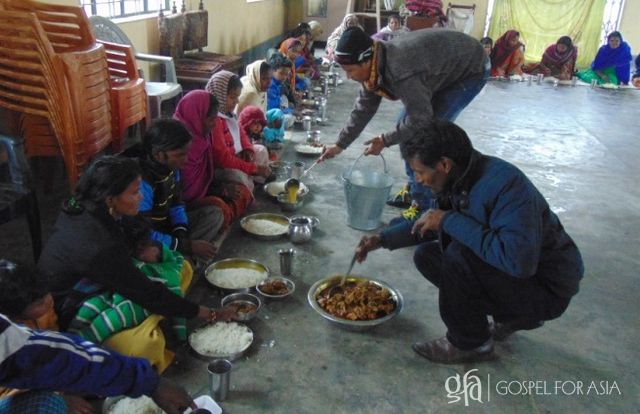
Bhadraksh had once been a young man, full of vigor. Married with a child, he worked hard for his young family. He had a stable and honest job in a thread factory, which clothed, fed and sheltered them. Life was simple and good.
That life seemed like another world now. As the memory of those times faded and the difficult reality of today zoomed into focus, Bhadraksh stood as a man deformed and nearly defeated by leprosy. Bhadraksh received a leprosy diagnosis more than 20 years ago, when he was a young man just beginning his life journey. The doom of his diagnosis plunged his life into an unforeseen and scary future.
Forced to leave his home because of his disease, Bhadraksh settled in a set-apart community with other leperosy patients in a different part of his country. With no family around, other than his wife and child, the leprosy colony became his extended family.
Serving Their Adopted Community—Heart, Soul and Body
Gospel for Asia (GFA)-supported Pastor Ravi and the women missionaries he served with were honored guests in this community. While they did not live in the colony—they lived centrally located to minister to several nearby villages—they served as an integral part of colony life. These servants of the Lord took the place of sons and daughters and fathers and mothers for the residents of the leprosy colony.
Pastor Ravi regularly visited this isolated community and prayed for the sick and encouraged them with God’s Word. Three Sisters of Compassion, who were part of Pastor Ravi’s ministry team, helped with practical needs such as cleaning and bandaging wounds and bathing and dressing those with limited mobility. They served this community with dedication and compassion.
Urgent Medical Needs Met
Eventually, Bhadraksh’s leprosy led to complications with his eyesight. His vision got worse and worse. A continuous discharge flowed from his eyes, and eventually, he lost all vision. He refused to venture to the larger town to see a doctor because of the shame of his disease. He also could not hope to pay for any treatments.
Noticing the critical condition of many residents, including Bhadraksh, Pastor Ravi helped organize a Gospel for Asia (GFA)-supported medical camp focused on optical care in the leprosy colony. After getting a checkup, Bhadraksh underwent an eye operation that completely restored his vision. Darshan, another resident who had been blind from leprosy complications, also received surgery that restored his eyesight.
“I am truly thankful to [the church] and leadership for their immeasurable love and care to all those with leprosy, especially to me,” expressed Bhadraksh warmly. “I had lost my eyesight for many days. I regained my eyesight because of the help of [the church].”
Leprosy Colony Receives Another Blessing
This precious community also received another blessing—a winter clothing distribution! In the northern Asian climate where this colony is located, winter can be harsh, especially for leprosy patients who have already lost feeling. Pastor Ravi and his team of sisters happily gave warm clothing to the residents as yet another expression of Jesus’ love and care. After the warm clothes were passed out, everyone gathered for a meal provided by the Gospel for Asia (GFA)-supported workers. After living with continual rejection caused by their disease, the residents were warmed by the clothing on their bodies and the food within—but mostly warmed by the care and acceptance of the men and women serving them.
Once Cast Away, Now Embraced
Misunderstanding about the disease—and lack of access to treatment for the poor— leads to fear and rejection of those who contract leprosy. Gospel for Asia (GFA)-supported national missionaries and Sisters of Compassion often serve the neediest in Asian communities—like people with leprosy—who are pushed to the margins of society.
These servants of the Lord bring compassion and love to people in critical need of both. They treat residents of these leprosy colonies with dignity—a dignity some haven’t experienced since their diagnosis. The missionaries care for leprosy patients like family—meeting physical, emotional and spiritual needs.
